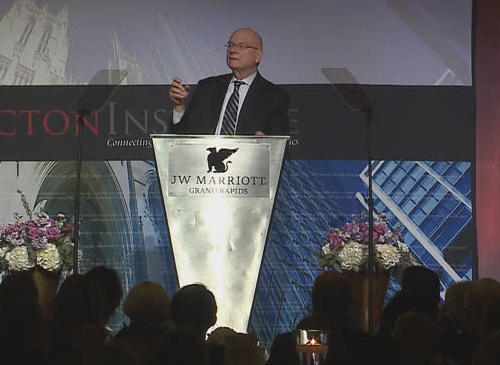
One of the dangers of forming a modern identity around achievement is what Rev. Tim Keller calls “the success-failure whiplash.” Succeeding in one area can cause people to believe they have the skills and inner qualities to do anything, and everything, alone – that they are omnicompetent.
Keller discussed the process in his address to the Acton Institute’s 2018 annual dinner, which he titled “Identity, Business, and the Christian Gospel”:
If your identity has become your business and your profession, then when you’re successful it does literally go to your head. And what I mean by that is this: If you’re successful at making money, which means you’re really good at making money, you start to believe you’re an expert on everything. And nobody will tell you, because they’re kind of afraid of you. But the fact is you really feel like, ‘I’m an expert on art. I’m an expert on ministry. I’m an expert on everything.’ And that’s a sign of idolatry. That is a sign that what has happened is you have turned your success into an identity. You’re not just good at making money; you’re good. You’re not just important. You’re not just prominent in business; you’re prominent. You’re important. You’ve made it.
The dizzying elation of success, Keller warned, has a polar opposite: “Failure goes right through your heart, because you don’t have a self left.”
Sometimes humility allows people to admit their shortcomings.
“When I first ran for public office, I said, ‘Elect me. I’m a businessman,’ so, they elected me,” Barry Goldwater told ABC’s 20/20 in 1993, in his typically unadorned way. “It took me two years to find out that a businessman didn’t know what the Hell was going on in politics.” (His uptake proved remarkably swift.)
The differing competencies needed to succeed in widely divergent fields is at the heart of Howard Gardner’s theory of “multiple intelligences” (a theory embraced by Charles Koch). Gardner said, briefly, that someone may excel in one aspect of learning but not another. An architect may not have a firm grasp of theoretical physics, and you would not want a physicist to design your home. It is the theory behind the division of labor, specialization, and comparative advantage. This cooperation helps assure that diverse societies operate harmoniously. Ludwig von Mises noted how each person focusing on his own contribution “makes for harmony of the interests of all members of society.”
Suppose, though, the identity crisis does not belong to an individual exaggerating his or her personal gifts. Imagine that people embraced the idea that all social problems could be solved by only one of the countless social institutions in the country: the government.
The omnicompetent state
Government was instituted to protect our God-given rights, repel foreign invasion, and to coin a standard currency. As long as it limited itself to these functions, it did its job well. But slowly, the people turned to government to solve their other problems: They asked politicians to eradicate poverty, provide healthcare, maintain a predetermined price for farmers’ crops, pay for college tuition, establish a national school curriculum, distribute contraception, mediate employment disputes, set proper dietary standards for every single American, and literally save the world. The list grows longer with each election.
To take on these gargantuan tasks, the federal government first began doing the functions that once belonged to states and local communities. Then it assumed duties that had been left to the free market. Slowly, government intruded into the realms of charities, churches, and families.
However, as Friedrich von Hayek observed, the government will always lack the information to accurately set prices, or forecast supply and demand. When government wades outside its constricted competency, it will fail.
What happens when a nation, like the newly elected Barry Goldwater, finds it is not equal to the task before it?
When socialism collapsed, the old Marxist societies found that they had nothing left to fill the vacuum. Churches, synagogues, and mosques lay decimated. Private charities could not grapple with the scope of the problem. Even the Boy Scouts had been put to flight.
“[W]hen the communist state disappears, there is nothing – at least for a time – to fill the void; no markets, no businessmen, no investors, no employment,” wrote Harold J. Wiarda, the late University of Massachusetts-Amherst professor (and Michigan native). “After forty-five years or two generations under communism, where were all those risk-takers, those markets, those entrepreneurs, the spirit of capitalism, and a free economy to come from?”
Government intervention into the economy had not just replaced those institutions; it absorbed them. The energy, passion, and duty that created civic organizations disappeared into a gray, bureaucratic void. Even in modern welfare states, Pope John Paul II has warned that the “loss of human energies” inevitably accompanies “an inordinate increase of public agencies.”
Government, like individuals, needs the humility to recognize its limitations. In the political realm, “multiple intelligences” could be expressed as sphere sovereignty, subsidiarity, federalism, or a robust and spontaneous order arising from vibrant intermediary institutions such as churches, charities, and voluntary associations (and, of course, individuals and families). By placing checks-and-balances within government, and reserving the bulk of society’s functions to individual choice, government will succeed at its intended goals and not be given the option of failing elsewhere.
Christians living out their role as citizens alone keep the totalitarian state at bay. Government is only limited when citizens stop inviting it to solve their every problem. They must agree to step up and fulfill their God-given callings in the economy, charity, education, and the broadest array of decisions that do not touch on government’s legitimate functions. To do that requires solving their most persistent problem: the twin sins of apathy and sloth.

